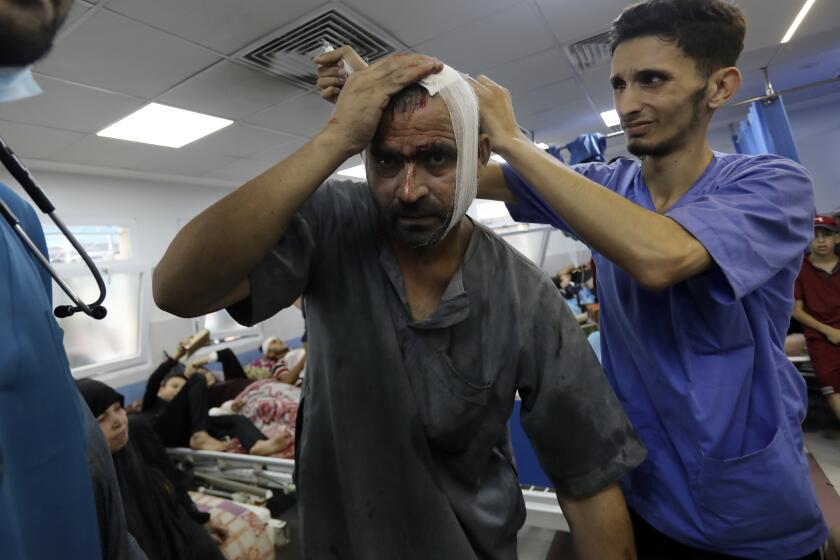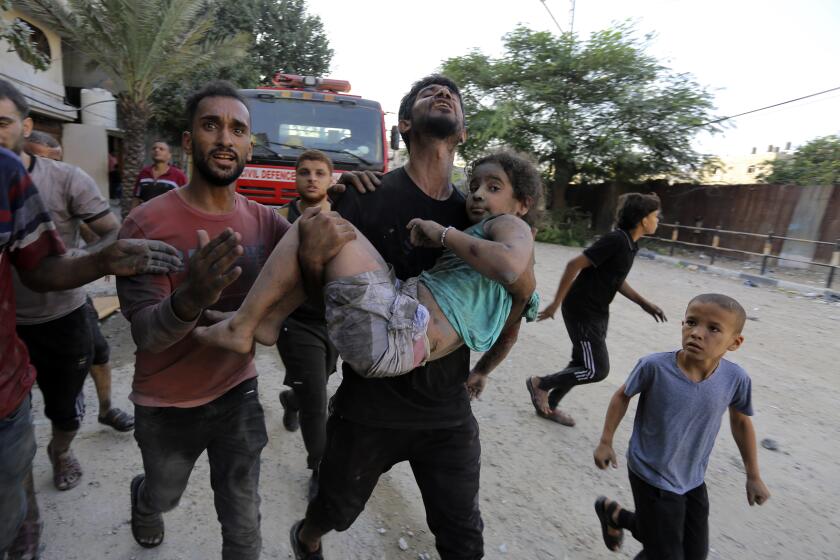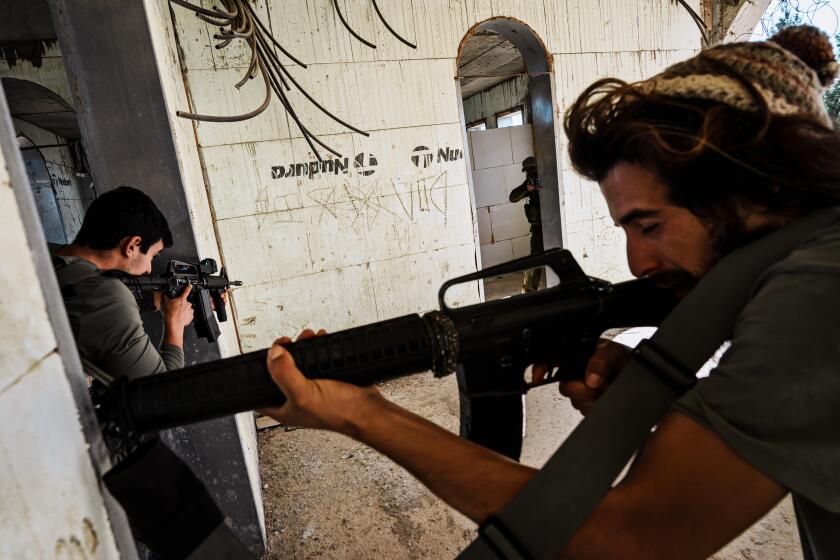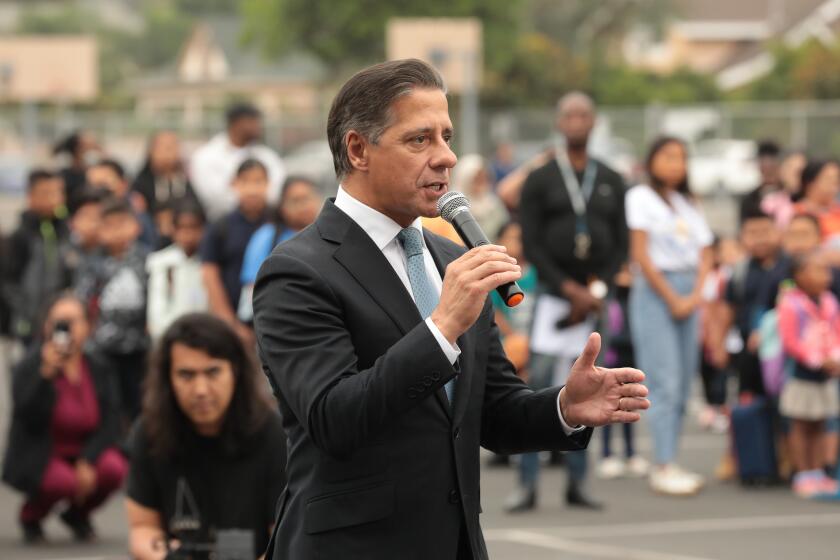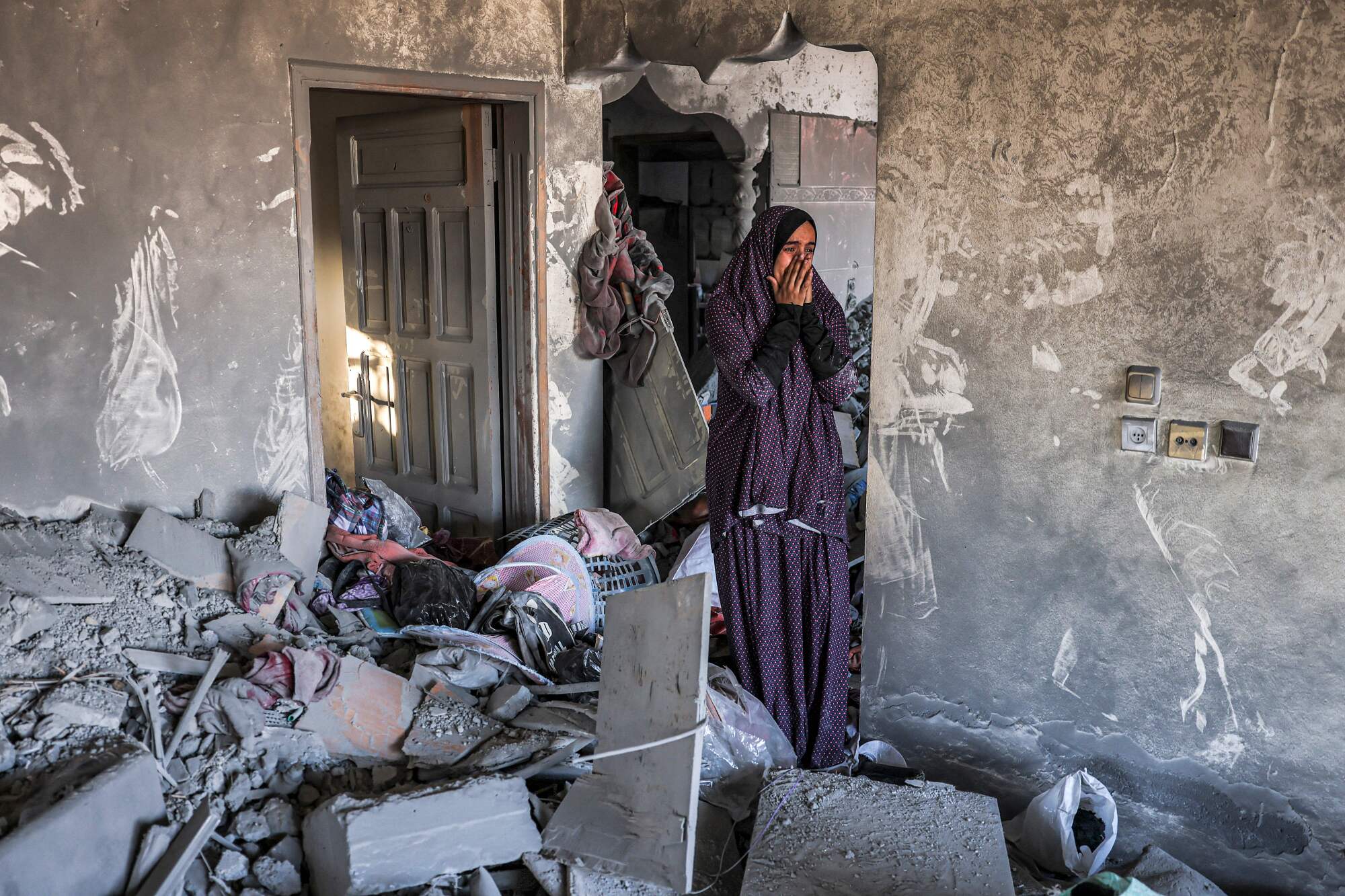
- Share via
I cannot stop thinking about the dozens of Israeli children held in captivity by Hamas and the Islamic Jihad in underground tunnels in Gaza, while above them Israel’s attack has killed, so far, nearly 4,500 Palestinian children. Stopping the violence, and returning the hostages, is urgent for any person who values all lives. That it is very difficult to imagine how this happens tells a terrible truth: Those with the most power to effect change refuse to recognize the humanity of all people.
There is little doubt that the Palestinians who participated in the mass murder of more than 1,200 Israelis and migrant workers on Oct. 7 did not see their victims as humans, and that decades of Israeli military occupation, siege, oppression and repeated attacks motivated this dehumanization. There is also little doubt about the dehumanization of Palestinians in Israeli society well before Oct. 7. Shirts printed by Israeli army units have depicted pregnant Palestinian women and children as military targets; calls of “death to the Arabs” have characterized the annual settler Flag March through the Old City in Jerusalem; and students as young as 13 in Israel sing anti-Palestinian songs, “hoping that your village burns down.”
Israel’s quest to root out Hamas has inflicted indiscriminate death and destruction on Gaza and Palestinian civilians. Humanitarian pauses are no longer enough.
Now, Israeli politics, society and media are awash with annihilatory language against Palestinians in Gaza, from the dehumanizing language of Defense Minister Yoav Gallant’s “total siege” order, where he referred to Palestinians as “human animals,” and journalists who have called to turn Gaza “into a slaughterhouse,” to banners on bridges in Tel Aviv that call “to annihilate Gaza.” Israeli state leaders, ministers in the war cabinet and senior army officers — people with command authority — have used such language dozens of times since Oct. 7 in a way that constitutes clear “intent to destroy,” according to the United Nations Convention on the Prevention and Punishment of the Crime of Genocide.
On Nov. 13, the Center for Constitutional Rights filed a lawsuit against President Biden, Secretary of State Antony Blinken and Secretary of Defense Lloyd J. Austin III for complicity with genocide. The lawsuit was filed in federal court in San Francisco on behalf of Palestinian individuals and organizations. It requests that the defendants stop “providing further arms, money, and diplomatic support to Israel on grounds that there is an unfolding genocide by the State of Israel against the civilian population of Gaza and the U.S. officials have a legal duty to prevent, and not further, this most serious of crimes,” according to the center.
The doctors I’ve worked with to build an advanced pediatrics system in Gaza now find that dream shattered. Children can’t get even the most basic care.
The submission to the court includes an expert declaration by three leading Holocaust and genocide studies scholars: Victoria Sanford, Barry Trachtenberg and John Cox. Sanford has written extensively on genocide and state violence in Latin America, especially in the case of Guatemala. Trachtenberg and Cox have published widely on the Holocaust. They stress in their report that the “levels of destruction and killings in just over one month, together with the annihilatory language expressed by Israeli state leaders and senior army officers, point not to targeting of individual Hamas militants or Hamas military targets, but to the unleashing of deadly violence against Palestinians in Gaza ‘as such,’ in the language of the UN Genocide Convention.”
The assessment of the three senior Holocaust and genocide studies scholars is accurate. Gaza now resembles Ukrainian cities after Russian bombings and invasions, but with levels of destruction and killings that have surpassed in less than a month what we have seen in Ukraine in nearly two years: Official U.N. figures from early September note that Russian attacks killed slightly fewer than 10,000 civilians since February 2022, and injured just above 17,500. Israel has so far killed more than 11,000 Palestinians, wounding nearly 30,000. It is important that Biden described Russia’s attack on Ukraine as “genocide” on April 12, 2022, commenting that “we’ll let the lawyers decide, internationally, whether or not it qualifies, but it sure seems that way to me.” In the same way, Gallant’s “total siege” policy, together with the forced displacement of more than 1.5 million of the 2.3 million Palestinians in Gaza, has created what sure seems like genocide.
Hamas’ attack on Israel has hardened the settler movement. Increasing violence in the West Bank threatens to open another front in the conflict.
Indeed, Palestinians in Gaza are facing a “slow death” of hunger and thirst, surviving on two pieces of bread and three liters of water a day per person — as much as 97 liters less than the minimum suggestion of the World Health Organization. The lack of clean water and the severe overcrowding in the southern part of Gaza — where hundreds of thousands of Palestinians from the northern part have fled — have markedly increased the risk of outbreak of infectious diseases. The lack of fuel and medical supplies, coupled with Israeli bombings of hospitals and the Israeli army operation inside Shifa Hospital, has turned hospitals into sites of mass death. And all along, Israel continues bombing the southern part of Gaza. No place in Gaza is safe from Israel’s assault, which is, in the language of Article 2 (c) of the U.N. Genocide Convention, “deliberately inflicting on the group conditions of life calculated to bring about its physical destruction in whole or in part.”
These unfolding horrors render it extremely difficult to imagine possible futures beyond the violence. I spoke about this last weekend at Kol Tzedek, my Jewish congregation in Philadelphia, from my perspective as an Israeli and Jewish Holocaust and genocide studies scholar. I noted that Israel’s mass violence against Palestinians stems from a new Jewish identity, tied to the creation of Israel in 1948: Jewish supremacy. I also noted that white supremacists in Europe and the U.S. find Israeli state practices of Jewish supremacy inspiring — even as they hate Jews in Europe and the U.S. deeply. While Israel and its allies strive to portray any criticism of Israeli policies and violence against Palestinians as antisemitism, some of Israel’s greatest supporters, such as American white supremacist Richard Spencer or Hungarian Prime Minister Viktor Orbán, are fierce antisemites.
Jewish parents have formed an association to support their schoolchildren. Muslim parents recently did the same as Mideast tensions reach the schoolhouse.
This terrible fact should direct us to the roots of the historical struggle against antisemitism before the creation of Israel in 1948. It was a struggle that aimed to protect a powerless group from powerful states, not to defend a powerful state in its attack against a powerless group. It was a struggle for a people to live in dignity in a society where everyone’s humanity is recognized, not to legitimize a state where leaders, politicians and TV anchors call openly to wipe out places and people.
Imagining possible futures, beyond Israel’s Jewish supremacy, then, is for me a political act rooted in Jewish histories and Jewish identities that are not far removed from us. They point to the urgent need to forefront Palestinian voices and experiences, to humanize Palestinians in the face of attempts to demonize and silence them, to call for a cease-fire and the return of all the hostages held in Gaza and the political prisoners held in Israel and to insist on truth, justice and equality for everyone between the Jordan River and the Mediterranean Sea.
Raz Segal is an associate professor of Holocaust and genocide studies and endowed professor in the study of modern genocide at Stockton University in New Jersey.
More to Read
A cure for the common opinion
Get thought-provoking perspectives with our weekly newsletter.
You may occasionally receive promotional content from the Los Angeles Times.
